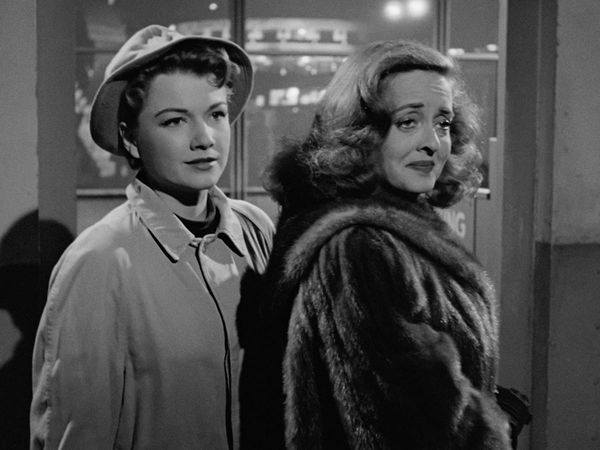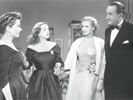Eye For Film >> Movies >> All About Eve (1950) Film Review
All About Eve
Reviewed by: Anton Bitel

It is 1950, and Joseph L Mankiewicz's All About Eve has received 14 Academy Award nominations - more than any other film made before or indeed since, until James Cameron's Titanic (1997) came along to sweep the board. Its aging lead Bette Davis, who was effectively attempting to make her comeback with the film after a recent raft of flops, was of course up for Best Actress - but so too was her much younger co-star Anne Baxter, who had let it be known to the Academy that she would not accept a nomination merely as Best Supporting Actress. The result was a split vote, with the award in the end going to Judy Holliday in the more forgettable Born Yesterday.
It is a scenario that seems to have modeled itself on the film itself. All About Eve opens near its chronological end, with the announcement that Baxter's character Eve Harrington has beaten her older mentor-turned-rival Margo Channing (Davis) to a dramatic award for Best Performance (which was the film's original title).

Flash back to Eve's first backstage encounter with her idol Margo, and there is a spark of asymmetrical recognition between the breathless, starstruck not-quite-ingénue and the worldweary, acid-mouthed grande dame of the theatre. In Eve, Margo sees the youth of her past, while in Margo, Eve sees the realisation of all her ambitions for the future - and from here on the film traces the rise of one and the fall of the other, as Eve insinuates herself into Margo's world in a viciously calculated effort to displace her, with Margo all too painfully aware of what is going on. Her only revenge can be the irrevocable laws of gravity which will eventually - inevitably - bring Eve down too, and we are left to suspect that the talented starlet, in fact more naïve than she pretends to be, will land that much harder than her one-time patroness.
At one point near the end of Mankiewicz's film, the caddishly cynical theatre critic Addison DeWitt (George Sanders) refers to Eve as a "killer" - and although no actual blood is shed (the lethal blows here are all verbal), it is possible to discern in Eve's malicious ascendancy the elements (her sociopathic manipulation and marriage-wrecking seduction of those around her) that would later characterise the whole 'bunny-boiler' thriller subgenre, from Play Misty For Me through Fatal Attraction, Poison Ivy, Single White Female, The Hand That Rocks the Cradle, The Temp and The Page Turner.
So, unsurprisingly, All About Eve offers a fairly bleak portrait of feminine power and its dependence on not just real talent, but also on mask-wearing, youthful attractiveness, and a ruthlessness towards other women. Eve may be, as Margo puts it, "Little Miss Evil", but so, we imagine, was Margo herself once, and in the film's final, memorable image, an even younger woman (Barbara Bates) poses with Eve's dress and award before a wall of mirrors, making it clear that Eve too will one day become a victim of the very same drives that propelled her to the top. As the biblical title suggests, this is all about the Fall of Woman, with feminine jealousy, insecurity and self-loathing at its core - although the film's details are too nuanced for it to be, at least in any straightforward way, misogynistic.
When a film has achieved the classic status of All About Eve, it can easily withstand a bit of negative criticism. Much like Davis' rasp-voiced heroine, the film is starting to show its age - even if it has recently undergone a full makeover with a flawless frame-by-frame digital restoration. Many of today's viewers may find its length a challenge, for what is essentially a dialogue-driven melodrama - and there is no denying that the film is not just concerned with the theatrical world, but is also itself decidedly stagey, with far more tell than show to it.
If it were remade for contemporary tastes and more media-savvy times, All About Eve would be shorter, more sexually explicit, and set in the world of cinema rather than theatre. In fact, if it were remade today, it would probably be something like Yukihiko Tsutsumi's hyperkinetic bitchslap 2LDK (2003) – which of course reveals as much about our own age as about the studio system's 'Golden Age' in the 1950s.
There is so much to admire in All About Eve, even for those too young to be drenched in nostalgia for the spectacle of Bette Davis unleashing her sharp tongue. The performances are all bitterly precise and all the more generous for being so unflattering, the lines are more barbed than a scorpion's tail, and there is even a hilariously self-referential cameo by one Marilyn Monroe as a vapid starlet who is sleeping with the producer. And for the harshness of its cynicism, it has few rivals.
Reviewed on: 20 Nov 2007


















